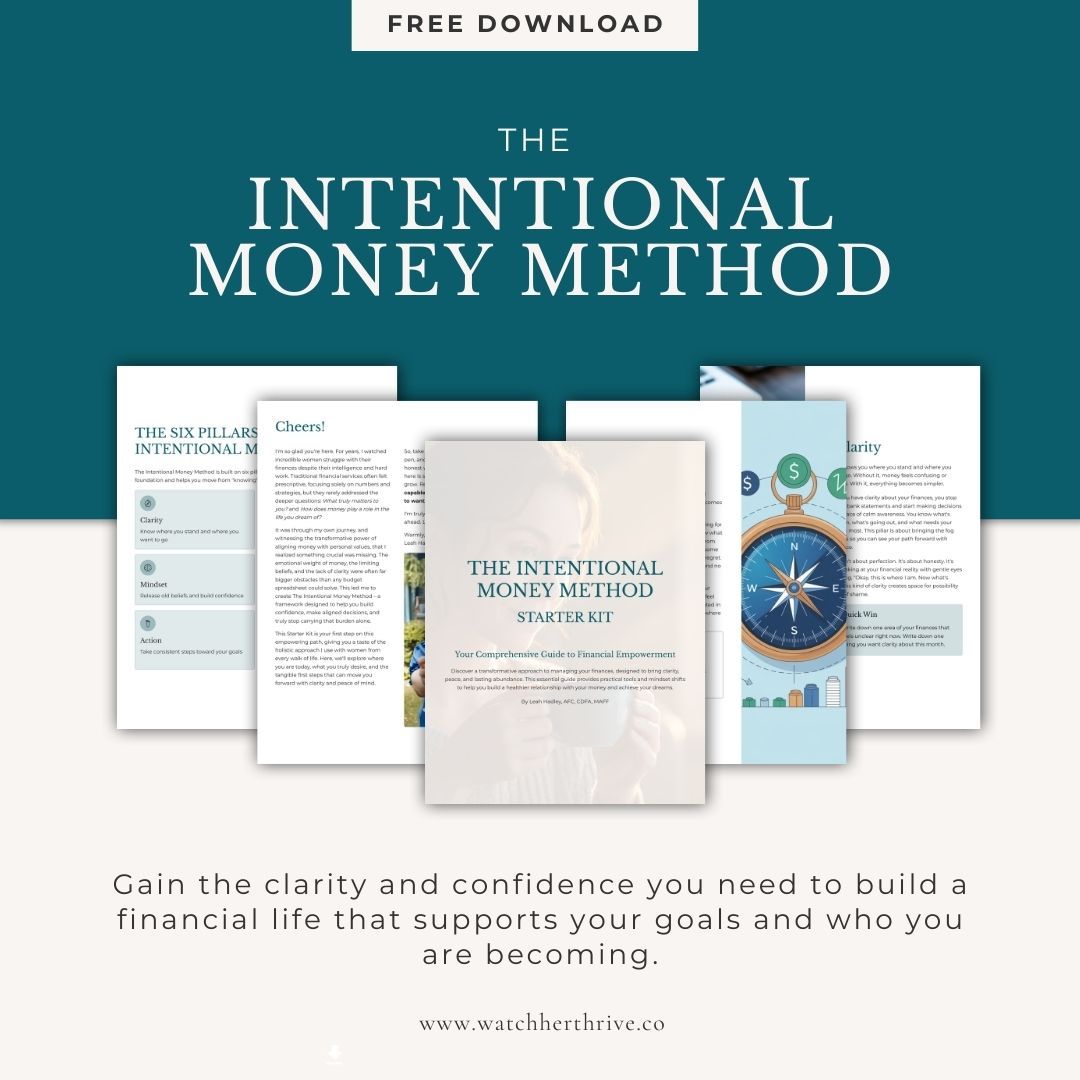Setting Financial Boundaries With Your Adult Children Is an Act of Love

Setting financial boundaries with adult children can feel emotionally complicated, especially for women in midlife.
Many women come to me saying something like this:
“I want to help my adult child, but I’m starting to feel anxious, resentful, or stretched too thin.”
If that sounds familiar, take a breath. Nothing has gone wrong. This is often the moment when awareness shows up before change.
Helping adult children financially can come from a place of deep love. But when that support continues without clear boundaries, it can quietly create stress, guilt, and tension that no one really wants.
Setting financial boundaries is not about withdrawing love. It is about creating clarity, sustainability, and trust for everyone involved.
Why Financial Boundaries With Adult Children Matter in Midlife
Midlife is a season of competing responsibilities. You may be planning for retirement, supporting aging parents, rebuilding financially after divorce, or growing a business. At the same time, ...
How to Start Legacy Planning Conversations With Your Family: A Compassionate Guide

Legacy planning conversations are some of the most important discussions families can have, yet they are also the ones most often avoided. In a recent masterclass inside the Empowered Sisterhood, I taught a values based approach to these conversations and shared how to prepare both assets and loved ones for the future with clarity and compassion.
Legacy planning sounds straightforward on the surface. In reality, these conversations touch deeply emotional areas of family life. Anyone who has ever settled a loved one’s estate knows how difficult it can be when clarity is missing or communication never happened.
This subject is especially meaningful to me right now. When my mom passed away unexpectedly, I experienced firsthand how powerful clear communication can be. She shared her wishes openly, helped me understand what I needed to know, and made sure I felt prepared. That clarity was a tremendous gift in the middle of grief, and it reinforced the importance of intentional legacy plan...
Building a True Money Partnership: How Women Can Create Trust, Transparency, and Confidence with Their Finances

When it comes to feeling confident with your money, most women aren’t just looking for investment returns. They’re looking for relationship returns.
A true money partnership between a woman and her financial team goes deeper than numbers or market performance. It’s about trust. It’s about being heard and respected. And it’s about having people beside you who help you align your money with your values, your goals, and your bigger vision for your life.
In The Empowered Sisterhood, we talk a lot about reclaiming your financial power. One of the most powerful ways to do that is by building a financial partnership that feels genuine and grounded in mutual respect.
Let’s look at what that kind of partnership really means and how you can start creating it today.

Trust Is the Heart of Financial Empowerment
Trust is the foundation of any healthy relationship, and that includes your relationship with your advisor.
When you trust your financial team, you feel comfortable asking questions...
Overcoming Recency Bias: Why Saving Still Matters and How Your Inner Circle Can Make All the Difference

When it comes to investing, our minds can play tricks on us. One of the most common culprits is recency bias, the tendency to let the latest events loom larger in our decision-making than they should. When markets are strong, it convinces us that this will continue forever, tempting us to overpay. When markets drop, it tells us the slide will never end, pushing us toward panic-selling and missed opportunities.
It is human nature. We are wired to respond to what is happening right now. But that wiring can hurt us when it comes to our finances. The antidote is not complicated. It is returning to timeless fundamentals that work in good times and bad. One of the most powerful fundamentals is saving.
Why Saving Still Deserves the Spotlight
Investing tends to get all the attention. We hear about record-breaking stock highs, dramatic losses, or the latest hot trend in real estate or crypto. Saving rarely makes headlines. It is not flashy and it is not fast, but it is foundational.
A stron...
How to Keep The Winds of Change from Blowing You Off Course

by Liesel Darby, Mediator & Divorce Coach
What do the following have in common?
- You’re in the grocery store, looking for your favorite brand of stone-ground mustard, only to find that they no longer carry it. The replacement brand is twice the price, and you don’t like the packaging either.
- You’re accustomed to your second shift schedule, but you have just been informed that you are moving to first shift for the foreseeable future. This throws a wrench in your Pilates class schedule.
- Your spouse has just announced that he is leaving you for the neighbor down the street that you have been casually saying hi to on your evening walks if she’s out in the yard.
If you answered “things that make you go hmmmm,” you are partly correct. Actually, these are all examples of change, albeit in varying degrees of the impact it will have on a person’s life. New mustard brand versus your world being turned upside down by divorce are not on the same par, for sure. If you’ve been around in this...
Life’s “F-Word”: Fairness

by Liesel Darby, Mediator & Divorce Coach
Growing up, you likely heard others, at some point, say the “F- word”, and it wasn’t’ “fudge.” It was a taboo word, and could possibly land you with a bar of soap in your mouth. In this blog we will discuss a different “F-word”, and it still isn’t “fudge”, but it can still cause all sorts of unpleasant side effects for the unfortunate user. The guilty word is FAIR, and by extension, FAIRNESS.
The Good, the Bad, and the Ugly
What’s so bad about fairness? The concept itself seems benign enough and has the ring of righteousness to it. When we perceive that a situation is fair (usually that means it benefits us in some way), life is good. However, that is precisely the problem. It is the expectation that things should be fair, and when they are not, we can feel like our world is in despair. We feel indignant, out of sorts, and want the situation to be corrected, pronto. At the extreme end, if we feel we have been legally wronged in some way...
Spring into Renewal: New Beginnings for Financial Empowerment

Spring, with its symphony of budding leaves and the soft hum of renewed life, is more than just a change in the calendar. It's a metaphor for rebirth, a reminder that no matter how barren the branches of our lives may appear, the potential for growth always exists. Each sprout breaking through the soil carries a whisper of promise and begs the question: what in your life is awaiting rebirth?
Hello, brave souls. Yes, you—the women who are emerging from the cocoon of financial dependency into the empowering sunlight of fiscal autonomy. Spring is calling to each of you, beckoning you to plant seeds of independence and cultivate a garden of self-sufficiency.
From Barren to Blossoming
It’s that time of year again, when everyone is sick of the cold weather. If you have to wear a turtleneck one more time, you will scream. It seems as if the days of feeling a warm breeze blow through your hair, let alone lounging by the pool in your new bathing suit, are a long way out. The trees are still...
The Power of a Support Group for Life After Divorce

Picture this: You just received your final divorce papers, and it is sinking in that you are free to move on to the next chapter of your life. The only problem is that it looks suspiciously like yesterday, except if you wanted to marry someone tomorrow, you could. No one comes to mind. While you are planning to drink a glass of champagne later with your bestie to celebrate, it is only 10 o’clock in the morning, and you are having feelings that are the exact opposite of celebrating.
Now you’re confused. You had thought that once you were divorced, you would feel…happy? Inspired? Free? Instead, all that you feel is fear, sadness, and loneliness. This can’t be all there is, right?

You know what your settlement numbers are, so you sit down to make a budget. Essentials are covered. Are weekly manicures considered essential? Looks like they’re not. Daily Starbucks? Maybe if you pack your lunch every day, those can stay. What about Netflix? This is not fun.
You decide to try out a dating...
Navigating Difficult Financial Conversations

Financial conversations can be tough to navigate in life. Whether it's discussing budgets with your spouse, talking to your children about spending habits, or helping aging parents handle their estate, these discussions require courage and tact. Managing these challenging financial conversations successfully is crucial, and it's understandable if you feel overwhelmed. Rest assured, you're not alone. Many people face similar situations and find it comforting to have guidance and support. If you're looking for help in navigating these conversations, know that there are resources available to assist you on your financial journey.
As a financial planner and mediator, I deeply understand the challenges that conversations about money can bring. We've gathered a few valuable tips along our journey that we'd love to share with you.
We're here to provide support and guidance as you navigate these important discussions. With our compassionate and empathetic approach, we aim to help you achieve...
Charting Your Course: Retirement Planning for Women in Their 50s

Navigating the complex waters of retirement planning for women can often feel overwhelming and daunting, particularly after experiencing significant life events such as a job loss or divorce. However, it's important to recognize that entering this phase also presents an empowering opportunity to reshape and refocus on a future that is tailored specifically to your needs and aspirations.
As many individuals begin to give retirement planning the gravitas it deserves in their 50s, it becomes increasingly indispensable for single women to approach this phase with both strategy and intention. This comprehensive guide is designed to provide you with invaluable insights, practical steps, and expert advice needed to instill confidence in your journey to a secure retirement. By equipping yourself with the right knowledge and tools, you can navigate the intricacies of retirement planning with ease, ensuring a secure and fulfilling future ahead.



